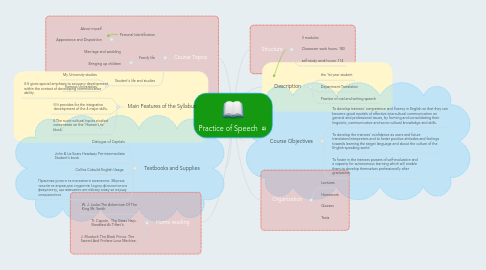Practice of Speech
by Julia K

1. Course Topics
1.1. Personal Identification
1.1.1. About myself
1.1.2. Appearance and Disposition
1.2. Family life
1.2.1. Marriage and wedding
1.2.2. Bringing up children
1.3. Student's life and studies
1.3.1. My University studies
1.3.2. Famous Universities
2. Main Features of the Syllabus
2.1. It gives special emphasis to accuracy development within the context of developing communicative ability.
2.2. It provides for the integrative development of the 4 major skills.
2.3. The socio-cultural topics studied concentrate on the ‘Human Life’ block.
3. Textbooks and Supplies
3.1. Dialogue of Capitals
3.2. John & Liz Soars Headway Pre-intermediate Student's book
3.3. Collins Cobuild English Usage.
3.4. Практика усного та писемного мовлення: Збірник текстів та вправ для студентів І курсу філологічного факультету, що вивчають англійську мову як першу спеціальність
4. Home reading
4.1. W. J. Locke.The Adventure Of The King Mr. Smith.
4.2. Tr. Capote. The Grass Harp. Breakfast At Tiffani’s.
4.3. J. Murdoch The Black Prince. The Sacred And Profane Love Machine.
5. Structure
5.1. 3 modules
5.2. Classroom work hours: 180
5.3. self-study work hours: 114
6. Description
6.1. the 1st year student
6.2. Department:Translation
6.3. Practice of oral and writing speech
7. Course Objectives
7.1. To develop trainees' competence and fluency in English so that they can become good models of effective intercultural communication on general and professional issues, by forming and consolidating their linguistic, communicative and socio-cultural knowledge and skills.
7.2. To develop the trainees' confidence as users and future translators/interpreters and to foster positive attitudes and feelings towards learning the target language and about the culture of the English-speaking world
7.3. To foster in the trainees powers of self-evaluation and a capacity for autonomous learning which will enable them to develop themselves professionally after graduation.
8. Organization
8.1. Lectures
8.2. Homework
8.3. Quizzes
8.4. Tests


